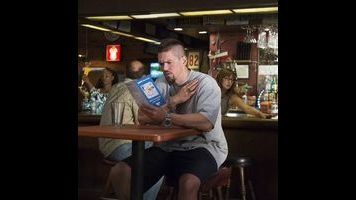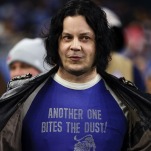There’s a lot of symbolic weight to the death of the Gallagher washing machine.
First, you have the history of that particular machine: it was given to the family by Jimmy, which Fiona acknowledges foreshadowed its future malfunction. In a way, it’s the last vestige of Jimmy’s presence, an artifact of Fiona’s past relationships in a season where she’s hitting up her Tinder dates for financial advice instead of jumping from boyfriend to boyfriend.
Second, the machine’s death serves as a contrivance to highlight Fiona and Vee’s cold war, which has only escalated after last week’s altercation at the Alibi. None of the people around them entirely understand what they’re fighting about, but a broken washing machine is the type of thing that would normally have brought them together; instead Fiona is heading to the local laundromat, and gives Vee the cold shoulder when she drops off laundry that Ian took next door.
Third, and most importantly, the broken washing machine is also entirely ordinary for a South Side Chicago family like the Gallaghers. No one panics that the washing machine is broken: Carl whines about having to wash his shirt in the sink, but Fiona is nonplussed to take her clothes to the laundromat, and Ian quickly taps into the support system next door. While the convenience is something that helps the family, and they will seek to replace the machine given that many of them have stable employment, a broken washing machine is not out of place in a house like theirs. It is a symbol of their station in life—if anything, its existence in the first place was out of the ordinary, given Jimmy gifted it to them.
After largely eliding its gentrification storyline last year, “Own Your Shit” continues to demonstrate Shameless’ interest in exploring the Gallagher way of life in contrast with the world around them. It becomes most clear here as Frank ends up on an opposite path: as Fiona is discovering the broken washer, Frank wakes to learn a billionaire philanthropist in need of an image rehab has purchased the house to serve as a homeless shelter, resulting in hot water, flat screen TVs, and new appliances. When Carl sees the appliances being loaded into the homeless shelter, he whines that “even the homeless get better stuff than us,” and despite his teenage selfishness I see where he’s coming from. How hard must it be to see charity being given so freely—and to Frank, of all people—when you’re struggling to make ends meet?
There are two threads running through “Own Your Shit,” both derived from the episode’s title in their own way. The first is simple, as both Fiona and Lip begin to hatch plans to take ownership of their jobs, albeit differently. Fiona’s trip to the laundromat is really just an excuse to meet its owner Etta (June Squibb), who apparently has been holding down this South Side institution off-screen for decades. Etta’s under pressure from real estate moguls, Fiona’s getting advice about ownership from her Tinder hookup, and everything just sort of falls into place: Fiona takes ownership of half the business with plans to modernize, and Etta gets to keep her apartment. It’s contrived, but it also quickly formalizes Fiona’s aspirations to follow her boss Margo’s example, as amplified here by Margo’s appearance at the diner and a testy negotiation for a salary increase. While I would agree with everyone around her that Fiona needs to own her personal shit before she can start thinking about owning more professional shit, Fiona’s work world taking on more structure is effective, and provides a foundation for further development.
Lip, meanwhile, is taking a different approach, although with similar anxieties. Both Lip and Fiona are unsatisfied with the roles they’ve been playing, but whereas Fiona is trying to dramatically rewrite her role (no dealing with house stuff, icing out Debbie and Vee), Lip is continuing to play the part of the dutiful intern with the fantasy sports company and the casual hookup with Sierra, despite hating both with every fiber of his being. While the latter is still bubbling under the surface as Lip watches Sierra flirt with customers at the diner, the former has boiled over with the help of his old college friend, as he returns to his childhood days of stealing from unattended delivery trucks, but this time siphoning money from his employers. While I’m comfortable with the Robin Hood ethics underpinning Lip’s actions here, more concerning is the idea that Lip is using this as some sort of outlet for his identity crisis, and that’s pretty much the opposite of healthy. Between this and his alcoholism, Lip is currently attempting to treat some pretty serious issues in his life on his own, and much as there will be a point where Fiona’s strategy creates a larger issue, Lip is not building a sustainable model for his future here.
Sustainability is in short supply if you’re a Gallagher (or Gallagher-adjacent), although everyone’s in search of it: Kev, Vee and Svetlana’s plan to adopt one another’s kids is all about assuring their future, while Frank stumbles his way into a business model (albeit one he corrupts almost immediately by turning the residents into a work force and taking a cut of their begging profits). Debbie’s search eventually lands her in the lap of a solution (Sierra’s insurance-rich disabled brother in need of a caregiver), but her journey also put her under investigation for child endangerment. Carl, meanwhile, goes on a quixotic search for proof of his “blackness” to earn a diversity slot into military school, convinced it will be his way out of the South Side.
These stories vary in terms of effectiveness, tied to their understanding of the consequences of these actions. In general, Shameless has a fast-and-loose relationship with consequences: sometimes they’re there, and sometimes they’re not. Debbie got away with all that theft and shoplifting, for example, but here her run-in with Derek’s sister leads to an immediate visit from Family Services. But then you have Carl, whose deeply racist response to learning of the affirmative action policies of the show’s West Point equivalent is rewarded with previously undiscovered Native American heritage. It’s hard to get a read on Shameless stories this way: is Frank’s scheme building to a meaningful fall, or is it just a way to generate hijinks, like his and Debbie’s trip to the commune last season? Are we supposed to read into the legal consequences of Svetlana gaining parental rights on Kev and Vee’s twins, or is that just supposed to be another fun story for the ménage-a-trois? There’s some pleasure in that uncertainty, but there’s also an inscrutable quality that keeps me at a distance, unable to always trust the show in the way I want to.
Of the characters searching for stability, Ian’s situation is the most complicated, although in this case those complications are much more clearly articulated. There remains a somewhat didactic framing of Ian’s budding relationship with Trevor that can be a bit diminishing at points—the show made the understandable choice to make Ian as ignorant as possible to allow for scenes where he either explains what it means to be trans to other people or has it explained to him, giving the show space to account for audience members who aren’t familiar with the details. To its credit, this episode finds a way to make these details feel at home in Shameless’ universe, especially as Kev puzzles over the whole thing as Ian struggles to explain it to him. Similarly, while Trevor’s monologue veers into a lecture at points, I appreciated having trans issues discussed in the context of a show that can actually address said issues in explicit terms, something that we’ve seen less of in Elliot Fletcher’s characters on basic cable series that remained more chaste in their approach. That Trevor is allowed to be casually sexual is significant, even if the basic structure of the story—Ian wondering if it’s possible to have stability in either a relationship or even a hookup if the guy is trans—isn’t particularly compelling structurally.
“Own Your Shit” is about characters searching for stability, but the episode itself largely serves to assert the stability of its various storylines. Everyone ends the episode feeling largely settled in a particular path: while Debbie’s family services problem is treated as a cliffhanger, the episode provides a clear sense of where her story is headed, and we now pretty much have the same for every character involved. The result is not a particularly thrilling or game-changing episode, but the show continues to move purposefully, and has achieved a sense of clarity of storytelling that has been absent the past few seasons.
Stray observations
- There are some issues of political or social importance where I think it’s important to present both sides, but vaccinations is not one of them. I know it’s probably realistic to have someone like Vee rehash rumors about links to autism that she heard in passing from others, but I also found it deeply unsettling, and was not okay with where that story landed (with them only vaccinating half the kids to see what happened). Vaccinations are not a “Teach the Controversy” issue, and I didn’t care for how it filtered through Shameless’ tone here.
- If the death of Jimmy’s washer was really Chekhov’s Washing Machine and Jimmy is coming back, I’m gonna fly to Los Angeles, visit every Shameless writer’s home, and break their washing machines one by one.
- “You want me to vouch for your blackness?”—I still find Dom’s father’s involvement in Carl’s life weird, even after his little speech about it, but dude’s got jokes.
- “It’s moo, motherfucker. It’s moo”—I liked Ian and Kev’s “adult conversation.” It’s a nice way of acknowledging that Ian has “come of age,” and while we didn’t get much with the brothers this week, this helped fill the gap.
- “This DJ’s wild”—I struggled with this line. I don’t buy that any human being would say it in general, but I also think that I needed considerably more evidence to believe that anyone would say it about that DJ in particular. That did not strike me as a particularly wild generic dance music experience.
- After the brief inundation of bearded, shlubby friend characters on TV sitcoms, I never really bothered to learn any of their names, but I did remember that Sierra’s brother was the one in Mulaney and The Intern. (His name is Zack Pearlman.)
- Some of you may know I’m obsessed with empty coffee cups that TV shows pretend are full (#EmptyCupAwards on Twitter and Instagram), and there was a real unforced error from Cameron Monaghan when Trevor shows up with tea. There’s some weight problems in the initial handoff, but the real issue is that he keeps holding the cup as he sits, and thus keeps gesturing with it. Not only does it create some continuity errors (he’s taking a sip in one shot but not in the next), but no one would do that if that cup was as full as the context of the scene suggests.






![Rob Reiner's son booked for murder amid homicide investigation [Updated]](https://img.pastemagazine.com/wp-content/avuploads/2025/12/15131025/MixCollage-15-Dec-2025-01-10-PM-9121.jpg)

























![HBO teases new Euphoria, Larry David, and much more in 2026 sizzle reel [Updated]](https://img.pastemagazine.com/wp-content/avuploads/2025/12/12100344/MixCollage-12-Dec-2025-09-56-AM-9137.jpg)








